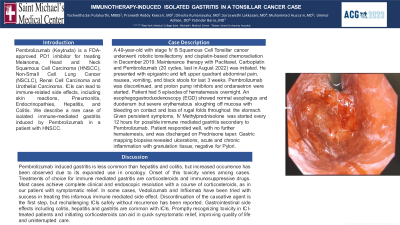Sunday Poster Session
Category: Stomach
P1372 - Immunotherapy-Induced Isolated Gastritis in a Tonsillar Cancer Case
Sunday, October 22, 2023
3:30 PM - 7:00 PM PT
Location: Exhibit Hall

Has Audio

Yashwitha Sai Pulakurthi, MBBS
New York Medical College-Saint Michael's Medical Center
Newark, New Jersey
Presenting Author(s)
Yashwitha Sai Pulakurthi, MBBS1, Praneeth Reddy Keesari, MD2, Dilesha Kumanayaka, MD1, Saraswathi Lakkasani, MD3, Muhammad Hussain, MD3, Ummul Asfeen, MD1, Yatinder Bains, MD3
1New York Medical College-Saint Michael's Medical Center, Newark, NJ; 2Staten Island University Hospital, Staten Island, NY; 3Saint Michael's Medical Center, New York Medical College, Newark, NJ
Introduction: Pembrolizumab (Keytruda) is a FDA-approved PD1 inhibitor for treating Melanoma, Head and Neck Squamous Cell Carcinoma (HNSCC), Non-Small Cell Lung Cancer (NSCLC), Renal Cell Carcinoma and Urothelial Carcinoma. ICIs can lead to immune-related side effects, including skin reactions, Pneumonitis, Endocrinopathies, Hepatitis, and Colitis. We describe a rare case of isolated immune-mediated gastritis induced by Pembrolizumab in a patient with HNSCC.
Case Description/Methods: A 49-year-old with stage IV B Squamous Cell Tonsillar cancer underwent robotic tonsillectomy and cisplatin-based chemoradiation in December 2019. Maintenance therapy with Paclitaxel, Carboplatin and Pembrolizumab (20 cycles, last in August 2022) was initiated. He presented with epigastric and left upper quadrant abdominal pain, nausea, vomiting, and black stools for last 3 weeks. Pembrolizumab was discontinued, and proton pump inhibitors and ondansetron were started. Patient had 5 episodes of hematemesis overnight. An esophagogastroduodenoscopy (EGD) showed normal esophagus and duodenum but severe erythematous sloughing off mucosa with bleeding on contact and loss of rugal folds throughout the stomach. Given persistent symptoms, IV Methylprednisolone was started every 12 hours for possible immune mediated gastritis secondary to Pembrolizumab. Patient responded well, with no further hematemesis, and was discharged on Prednisone taper. Gastric mapping biopsies revealed ulcerations, acute and chronic inflammation with granulation tissue, negative for Pylori.
Discussion: Pembrolizumab induced gastritis is less common than hepatitis and colitis, but increased occurrence has been observed due to its expanded use in oncology. Onset of this toxicity varies among cases. Treatments of choice for immune mediated gastritis are corticosteroids and immunosuppressive drugs. Most cases achieve complete clinical and endoscopic resolution with a course of corticosteroids, as in our patient with symptomatic relief. In some cases, Vedolizumab and Infliximab have been tried with success in treating this infamous immune mediated side effect. Discontinuation of the causative agent is the first step, but rechallenging ICIs safely without recurrence has been reported. Gastrointestinal side effects including colitis, hepatitis and gastritis are common with ICIs. Promptly recognizing toxicity in ICI-treated patients and initiating corticosteroids can aid in quick symptomatic relief, improving quality of life and uninterrupted care.

Disclosures:
Yashwitha Sai Pulakurthi, MBBS1, Praneeth Reddy Keesari, MD2, Dilesha Kumanayaka, MD1, Saraswathi Lakkasani, MD3, Muhammad Hussain, MD3, Ummul Asfeen, MD1, Yatinder Bains, MD3. P1372 - Immunotherapy-Induced Isolated Gastritis in a Tonsillar Cancer Case, ACG 2023 Annual Scientific Meeting Abstracts. Vancouver, BC, Canada: American College of Gastroenterology.
1New York Medical College-Saint Michael's Medical Center, Newark, NJ; 2Staten Island University Hospital, Staten Island, NY; 3Saint Michael's Medical Center, New York Medical College, Newark, NJ
Introduction: Pembrolizumab (Keytruda) is a FDA-approved PD1 inhibitor for treating Melanoma, Head and Neck Squamous Cell Carcinoma (HNSCC), Non-Small Cell Lung Cancer (NSCLC), Renal Cell Carcinoma and Urothelial Carcinoma. ICIs can lead to immune-related side effects, including skin reactions, Pneumonitis, Endocrinopathies, Hepatitis, and Colitis. We describe a rare case of isolated immune-mediated gastritis induced by Pembrolizumab in a patient with HNSCC.
Case Description/Methods: A 49-year-old with stage IV B Squamous Cell Tonsillar cancer underwent robotic tonsillectomy and cisplatin-based chemoradiation in December 2019. Maintenance therapy with Paclitaxel, Carboplatin and Pembrolizumab (20 cycles, last in August 2022) was initiated. He presented with epigastric and left upper quadrant abdominal pain, nausea, vomiting, and black stools for last 3 weeks. Pembrolizumab was discontinued, and proton pump inhibitors and ondansetron were started. Patient had 5 episodes of hematemesis overnight. An esophagogastroduodenoscopy (EGD) showed normal esophagus and duodenum but severe erythematous sloughing off mucosa with bleeding on contact and loss of rugal folds throughout the stomach. Given persistent symptoms, IV Methylprednisolone was started every 12 hours for possible immune mediated gastritis secondary to Pembrolizumab. Patient responded well, with no further hematemesis, and was discharged on Prednisone taper. Gastric mapping biopsies revealed ulcerations, acute and chronic inflammation with granulation tissue, negative for Pylori.
Discussion: Pembrolizumab induced gastritis is less common than hepatitis and colitis, but increased occurrence has been observed due to its expanded use in oncology. Onset of this toxicity varies among cases. Treatments of choice for immune mediated gastritis are corticosteroids and immunosuppressive drugs. Most cases achieve complete clinical and endoscopic resolution with a course of corticosteroids, as in our patient with symptomatic relief. In some cases, Vedolizumab and Infliximab have been tried with success in treating this infamous immune mediated side effect. Discontinuation of the causative agent is the first step, but rechallenging ICIs safely without recurrence has been reported. Gastrointestinal side effects including colitis, hepatitis and gastritis are common with ICIs. Promptly recognizing toxicity in ICI-treated patients and initiating corticosteroids can aid in quick symptomatic relief, improving quality of life and uninterrupted care.

Figure: Ulcerated Gastric Mucosa
Disclosures:
Yashwitha Sai Pulakurthi indicated no relevant financial relationships.
Praneeth Reddy Keesari indicated no relevant financial relationships.
Dilesha Kumanayaka indicated no relevant financial relationships.
Saraswathi Lakkasani indicated no relevant financial relationships.
Muhammad Hussain indicated no relevant financial relationships.
Ummul Asfeen indicated no relevant financial relationships.
Yatinder Bains indicated no relevant financial relationships.
Yashwitha Sai Pulakurthi, MBBS1, Praneeth Reddy Keesari, MD2, Dilesha Kumanayaka, MD1, Saraswathi Lakkasani, MD3, Muhammad Hussain, MD3, Ummul Asfeen, MD1, Yatinder Bains, MD3. P1372 - Immunotherapy-Induced Isolated Gastritis in a Tonsillar Cancer Case, ACG 2023 Annual Scientific Meeting Abstracts. Vancouver, BC, Canada: American College of Gastroenterology.
